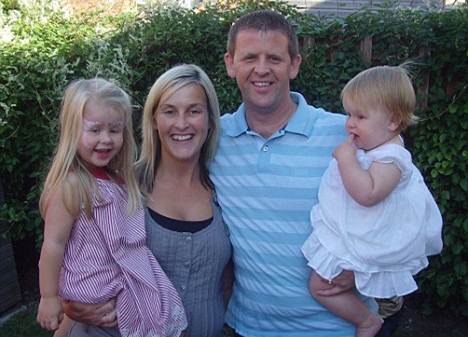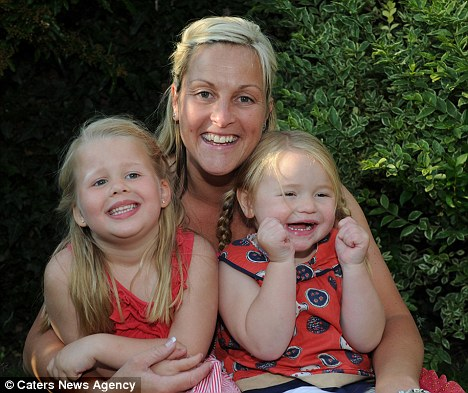One terrifying illness. Millions of
memories lost. A story of survival. Karan Waller describes her desperate
struggle to recover and rebuild her life.

Walking through the front door of her home,
Karren Waller felt panic as a blonde toddler tentatively tool several steps
towards her. When the child cried out ‘Mummy’ and threw her arms around her
legs, Karan burst into tears. Instead of experiencing a rush of maternal love,
she felt utter confusion. She knew that she had a baby at home but she didn’t
regconise this little girl with outstretched arms. Her husband, Ian, tried to reassure
her by saying, “Hello, Harriet. Mummy’s back,” but Karan’s mind was racing.
Karan’s amnesia was the result of major
surgery two weeks previously, to remove a lemon-sized brain tumour. Despite no
indication that anything was wrong, it had been steadily growing, undetected,
for nearly 20 years. Karan had two daughters – Harritet and Charly, now three
and five years old – but post operation, six months of her memory had been
erased. She was expecting her one-year-old daughter Harritet to be a small baby,
still waiting to utter her first word and take her first steps.
“I had been warned about memory loss, but I
was so focused on making it through the operation that I hadn’t really thought
about it,” says Karan, 35. “Hearing Harriet cry ‘Mummy’ completely threw me. I
couldn’t associate her with my baby.”
It was a sunny afternoon in June 2009 when
Karan suddenly collapsed at home in Runcorn, Cheshire. “I had been feeling
feverish all day, so I thought I was coming down with flu,” explains Karan. It
wasn’t until I’d picked the girls up from nursery and made it home that I began
to feel really strange.” The next thing Karan recalls is waking up on the sofa
to the sound of Harriet screaming. “To this day, I have no idea how long I was
out for,” she adds. Karan somehow managed to crawl upstairs to her bed. “I felt
really sick and dizzy. It was like having the worst hangover you have ever had,
but a hundred times worse.”
With the girls sitting next to her, she
telephoned her husband and begged him to come home. Karan then called her
mother, June, who insisted on talking her to a walk-in clinic. Doctors
immediately advised her to go to her local A&E for an emergency MRI scan.
A shock diagnosis
“When the doctors arrived with the scan
results, Ian sensed something was wrong because they pulled the curtain around
us,” Karan remembers. “They said they were sorry, but they had found a brain
tumour on the left-hand side of my head; at that point they did not know if it
was cancerous or benign. I must have been in shock, because my first response
was to ask to see the scan results,” says Karan.
“Looking back, I can see I went into
self-preservation mode – when you have kids it changes everything. I had to put
on a brave face, and refused to let myself think about what would happen to the
girls if something happened to me.”
Karan was transferred to the Walton Centre
in Liverpool, where neurosurgeon Sasha Burn explained that she had an
astrocytoma – a Grade II tumour, which is usually benign but can become
cancerous. Chemotherapy and radiation treatment were not viable options, and
this meant one thing: major brain surgery. Naturally, there were serious risks
involved. “The tumour was located next to an area that controls speech, so the
doctors discussed operating while I remained conscious so they could talk to me
and monitor my speech patterns,” recalls Karan. “They eventually decided it was
safe to operate using general anaesthetic, but they warned me that there was a
risk that I’d lose function in the right side of my body, permanently,” says
Karan. “Whatever the worst-case scenarios were, I know I had to have the
tumour removed. No matter what, I needed to stay strong.”
In one day, Karan’s life had
been turned
upside down, but she was determined to maintain some control. I have
eight
close girlfriends and one of them, Viki, was getting married in Gretna
Green in early September.” Karan wanted to delay the date of her
operation until
then. “The doctors and I agreed that as long as I felt well enough, I
could
travel up to Scotland and then come home for surgery.” Karan was put on
medication to prevent seizures and to reduce swelling. “I bought myself a
beautiful new outfit, and threw myself into the preparation for Viki’s
big day.
It was a way of forgetting what was happening to me. We were such a
tight-knit
group, I wasn’t about to let my diagnosis prevent me from being there
for
Viki.”
Days before her op, Karan’s friends threw a
party for her. They baked a huge cupcake, drank non-alcoholic wine and
surprised Karan with a bracelet with an angel charm. “It was their way of
making sure I had a guardian angel watching over me during the operation,”
Karan was so strong – she didn’t seem ill. She was still her lovely, caring and
funny self, and we were just sitting around and chatting with her. Although we
were all upset, we had to put on a brave face for Karan’s sake.”
…The day before the operation was an
emotional 24 hours. “Harriet and Charly were at nursery so I took my mind off
things by cleaning the house from top to bottom, knowning that I wouldn’t be
around for a few weeks,” says Karan. “I was trying to block out what was
happening. It was only when my friend Tracey came over with a card that it hit
me, and I burst out crying. It was a reality check; my life was now in the
hands of the doctors.”
The next morning, Karan struggled to say
goodbye to her daughters: “I was upset, but, weirdly, I didn’t feel scared. All
this time, I’d put a mental block on negative thoughts – I had to let the girls
know that Mummy would be alright.” Karan was taken down to theatre at 9am –
during an intense, nine-hour operation, the doctors successfully removed 90% of
the tumour. Karan finally came around that evening, and Ian was waiting by her
side. “She looked terrible. She had a huge scar across her head, and tubes and
wires attached all over her body,” he recalls. It quickly became apparent,
however, that Karan’s memory had been severely affected. Although she regconised
Ian and mother June, she didn’t know what year it was or her name. The doctors
kept asking me loads of questions and I just answered ‘yes’ or ‘no’ without
really knowing what I was saying,” says Karan. “Lying among all the beeping
machinery, suddenly, everything felt very real and frightening. I couldn’t put
up a front anymore; I began to cry. The frustration was immense. I couldn’t
understand why I was struggling with simple things. When Vikki visited me I
couldn’t remember her name – I’ve known her for 15 years. I didn’t know what a
potato was and I struggled to recall animal names like cow or pig. When I
switched on the TV, I couldn’t remember what shows I liked. It was like I’d
lost part of myself.”

Relearning the past
A week after her operation, Ian brought
Charly to see Karan. “I broke down when I saw her. When she spoke, it was like
listening to a child who was older than my daughter. Logically, I knew I
was her mum, but my gut feeling was that I was talking to a child I didn’t know.
There was no instant connection. It broke my heart. Charly was visibly upset
when she saw me. Hospital is scary enough for a young child, and I’m sure I was
acting differently, almost distant. To see something wrong with your mum is
terrifying – after all, your mum is meant to be indestructible.”
Two weeks later, Karan was discharged. In
an attempt to help reclaim her memory, Ian and Karan began to repeatedly watch
home movies of the girls and footage of their wedding day, as well as looking
at family photographs. “I had to go back to the basics and speed-learn
everything. We revised relatives’ names, and if we were going out for dinner,
Ian would remind me of who we were seeing. It was like preparing for an exam!
Sometimes, I’d see a shot of us and it would spark off a memory, which was
brilliant.” Karan also credits the Walton Centre with her recovery: “They have
been amazingly supportive, and it is good to know that the door is always open
for you at every stage.”
As the weeks went by, Karan began to enjoy
spending time with her daughters again, but she still experienced frustrating
memory loss: “I couldn’t remember what food the girls liked, what their daily
routine was, or what books they loved best. In those first couple of months, we
worried what effect it’d have on the kids. Charly became clingy and emotional,
so we decided to stop talking about my operation with her. As a result, she’s
settled back into life so much better; it is comforting to hear from her
teachers that she is doing well at school and that she has made lots of
friends.”
Despite her excellent recovery, Karan has
had to accept that some memories of her life are lost forever. “I still can’t
picture Harriet’s first steps or a large chunk of her first year. It’s
devastating,” says Karan. Doctors have told her that for the next two years,
memories will still come back, but after that point, anything lost is likely to
be lost forever. Karan has resolved to keep in top physical health and, just
six months after her operation, she and Ian completed the five-mile Runcorn
Widnes Bridge Run, raising $4000 for Astro Fund, a UK charity that supports
research into low-grade glioma tumours. “Going through brain surgery was
undeniably tough, but the run was one of the hardest thing I have ever done,”
Karan says.
In some ways, life has returned to normal,
but in other ways, things will never be the same again. “It has definitely
altered our perspective on life,” Karan says. “We don’t dither about treating
ourselves – we just do it – and we speak more openly, because now we realise
that life’s too short to beat around the bush.” Ian agrees: “What Karan has
been through has definitely brought us even closer together. I’m so proud of
how brave she has been through it all. She never ceases to amaze me.”